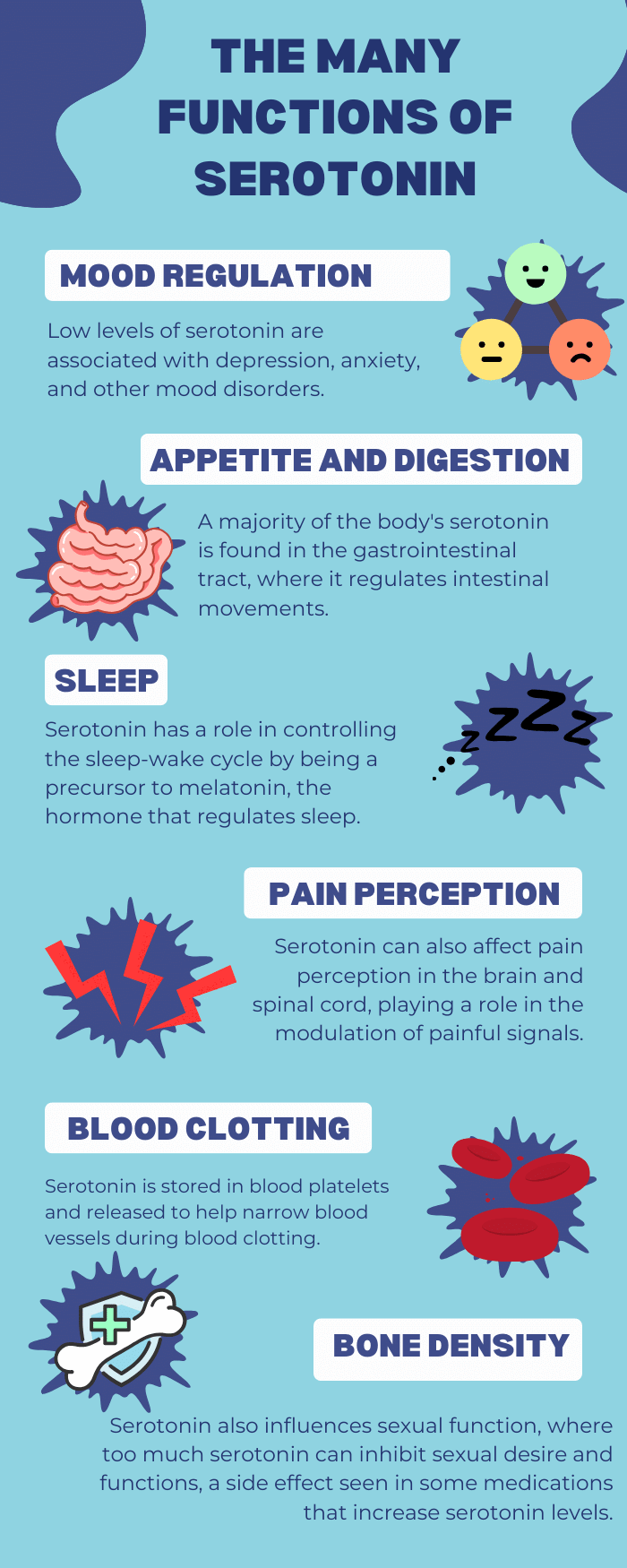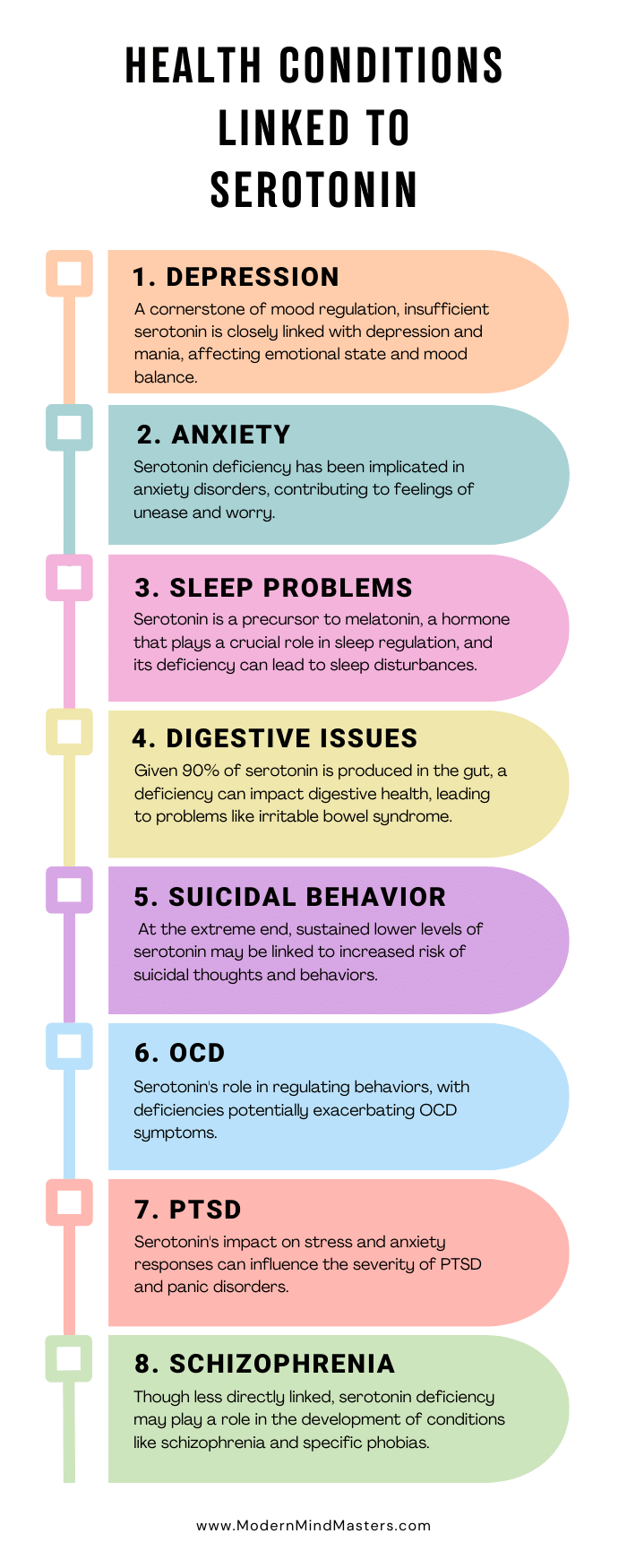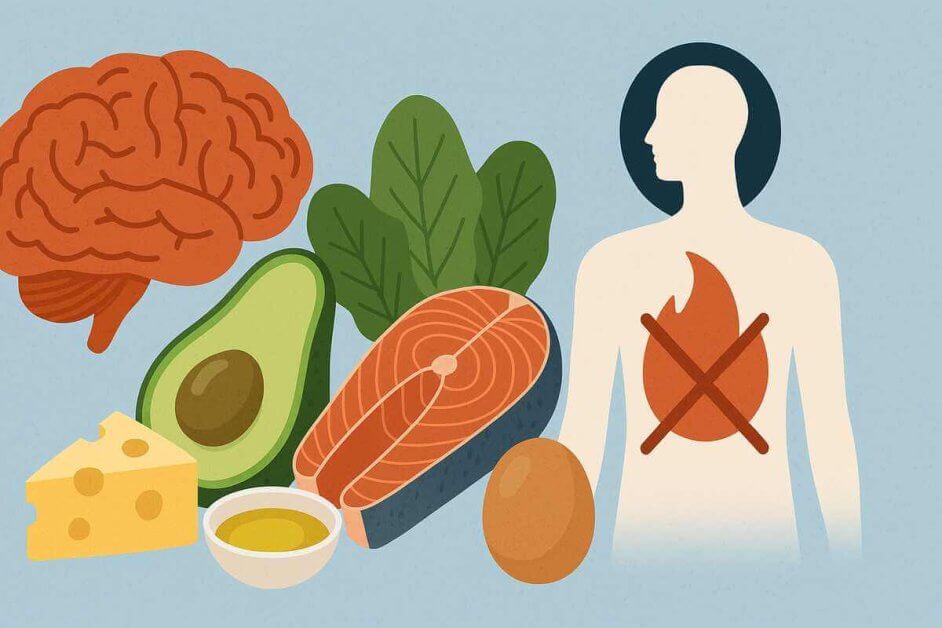
What is Psychedelic Therapy, and Can It Improve Your Mental Health?
Psychedelic therapy is an emerging treatment option for mental health conditions, where psychedelic drugs are combined with talk therapy to rewire certain parts of the brain.

Serotonin is a master regulator, influencing everything from our mood and sleep patterns to our appetite and digestion.
This vital neurotransmitter, synthesized from the essential amino acid tryptophan, serves as a critical messenger within the brain, affecting our psychological well-being while overseeing various physical functions.
This breadth of influence makes it a central figure in discussions about mental health, with dysfunctions in the serotonin system linked to a variety of psychiatric disorders.
This article will explore the dual realms of serotonin’s impact on the body and brain. We will also look into the complex interplay between serotonin and dopamine, another “feel-good” neurotransmitter, and examine how our modern lifestyle influences serotonin levels, from the food we eat to the amount of sunlight we receive.
Serotonin is a key neurotransmitter, a chemical substance that transmits signals between neurons and plays a crucial role in orchestrating the delicate balance of mood, sleep, appetite, digestion, and an array of other bodily processes.
This chemical marvel, found in the brain, blood platelets, and the digestive tract, is crafted from tryptophan, an essential amino acid acquired through our diet. Through a complex biochemical transformation, tryptophan becomes serotonin, enabling it to carry out its vital functions.
In the vast network of the brain, serotonin acts as a messenger, facilitating communication between nerve cells. This transmission of signals has a profound impact not only on our psychological well-being but also on various physical functions.
Despite serotonin’s reputation as a hormone that affects mental health, only 10% of serotonin is produced in the brain. The remaining 90% resides in the gastrointestinal tract, lining the walls of our intestines. Here, it’s released into the bloodstream and absorbed by platelets, playing a role in bodily functions that might seem unrelated at first glance.
Despite being one of the most significant neurotransmitters influencing mental health, the roles of serotonin are more far-reaching.
Like dopamine, serotonin plays a significant role in mood regulation and is often referred to as the “feel-good” neurotransmitter. Low levels of serotonin are associated with depression and other mood disorders, which is why many antidepressant medications focus on increasing serotonin levels in the brain.
As a precursor to melatonin, a hormone that regulates the sleep-wake cycle, serotonin also plays a crucial role in regulating sleep. Thus, the production of melatonin, influenced by the availability of its precursor serotonin, directly affects sleep patterns.
Other key functions include regulating appetite and digestion, pain perception, blood clotting, bone density, and sexual function, to name just a few.

The process begins with the amino acid tryptophan, which enters the body through tryptophan-rich foods such as nuts, cheese, red meat, chicken, fish, oats, beans, lentils, and eggs. Tryptophan is an essential amino acid, meaning the body cannot produce it and it must be obtained from food.
Once in the body, tryptophan undergoes a conversion into 5-hydroxytryptophan (5-HTP) through an enzyme called tryptophan hydroxylase, which can be influenced by various factors, including stress levels and the availability of certain cofactors like iron and vitamin B6. Finally, 5-HTP is converted into serotonin (5-hydroxytryptamine or 5-HT).
This entire synthesis process occurs primarily in two places in the body: 10% in the central nervous system (CNS), where it acts as a neurotransmitter, and the remaining 90% in the gastrointestinal (GI) tract, where it helps regulate intestinal movements. Serotonin produced in the GI tract cannot cross the blood-brain barrier, which means brain serotonin must be produced within the CNS to affect mood and cognitive functions.
Dopamine and serotonin are both known as the “feel-good” neurotransmitters, and share many similarities, such as mood regulation, impact on mental health, and influence on behavior.
Both are synthesized from amino acid precursors in the body; serotonin is made from tryptophan and dopamine from tyrosine.
While similar fundamentally, serotonin and dopamine have specific differences and distinct functions.
Serotonin is associated with happiness, focus, and calmness, while also helping to regulate digestive functions like bowel function and appetite.
Beyond its well-known role in motivation, reward, and pleasure, dopamine plays a critical role in controlling body movements and coordination, evident in conditions such as Parkinson’s disease, where a deficiency in dopamine within the basal ganglia leads to symptoms like tremors, stiffness, bradykinesia (slowness of movement), and impaired balance and coordination.
The interplay between serotonin and dopamine is complex, with each neurotransmitter influencing the other’s pathways and effects. For instance, optimal levels of serotonin can help moderate the pursuit of rewards by influencing impulse control and emotional regulation, thereby preventing excessive risk-taking driven by dopamine.
Conversely, adequate dopamine levels can enhance mood and contribute to the overall sense of satisfaction and happiness, potentially complementing the effects of serotonin.
Serotonin is one of the most important neurotransmitters influencing mental health, with clear-cut evidence of serotonergic dysfunctions affecting psychopathological disorders such as depression, anxiety disorders, eating disorders, schizophrenia, impulse control disorders, autism, and aggressive behaviors.
In particular, there is a large body of evidence supporting the association between the serotonergic system and major depressive disorder (MDD), a mental health condition characterized by persistent feelings of sadness and loss of interest, significantly impacting daily functioning.
Unlike dopamine, most serotonin is distributed outside of the central nervous system (CNS), influencing a wide range of physiologic processes in many organs. As such, serotonin-related disorders are a significant target for pharmacological treatments; selective serotonin reuptake inhibitors (SSRIs) are among the most prescribed antidepressant drugs in the world.
Changes in serotonin activity are also linked to mood disorders other than MDD. For instance, a study using a special brain scan technique found that people with bipolar disorder who weren’t taking medication had higher levels of a marker related to serotonin in their brains.
Studies also indicate that serotonergic activity may be associated with anxiety disorders, although the evidence remains inconclusive, with some studies reporting that there is no association or only an unclear one.
Neuroimaging studies have found no link between serotonin levels and schizophrenia, which is considered one of the most severe mental health conditions.
While some studies have found little correlation between serotonin and ADHD, this study found that a chronic deficit of serotonin (5-HT) at the synapse may trigger symptoms of ADHD, with imaging for animal models indicating an intimate interplay between serotonin and dopaminergic transmission. Oral administration of l-tryptophan, the amino acid precursor of serotonin, was shown to significantly alleviate ADHD symptoms.
The relationship between serotonin and addiction is complicated, with the exact impact of serotonin on addiction still not fully understood.
However, some research indicates that changes in serotonin activity might contribute to the development of autism, with this study finding that elevated serotonin was the first biomarker identified in autism spectrum disorder (ASD) and is present in more than 25% of affected children.
Interestingly, research has revealed that even among individuals without mental health conditions, there’s a connection between serotonin transporter levels and both stressful life experiences and stress hormones.
Serotonin deficiency, characterized by insufficient levels of serotonin in the brain, can lead to a wide array of health issues, spanning from mental disorders to physical issues.
The underlying reasons for low serotonin levels are multifaceted. Primarily, the body may not produce enough serotonin, leading to a natural shortfall of this crucial neurotransmitter.
Additionally, the body’s ability to utilize serotonin effectively plays a significant role. Inadequate serotonin receptors, or receptors that don’t function properly, can prevent the body from using serotonin as it should, compounding the problem.
Contrary to popular belief, the body does not produce serotonin itself; instead, serotonin is synthesized from tryptophan, an essential amino acid. The term “essential” highlights that the human body cannot produce tryptophan on its own, making it necessary to obtain this amino acid through dietary sources.
This means that our diet plays a crucial role in maintaining optimal serotonin levels, underscoring the importance of a balanced diet rich in nutrients that can supply sufficient amounts of tryptophan.
Serotonin plays an indispensable role in regulating a myriad of bodily functions and emotional states, and its deficiency has been linked to a broad spectrum of health issues, ranging from mental disorders such as depression, anxiety, and obsessive-compulsive disorder, to physical conditions like sleep disturbances and digestive problems.
Sustained levels of insufficient serotonin can lead to more severe outcomes, including increased susceptibility to suicidal behavior, and can exacerbate symptoms of post-traumatic stress disorder and panic disorders.
Even conditions such as schizophrenia and specific phobias may have connections to serotonin imbalance. The relationship between serotonin and mental health disorders, however, is complex and not yet fully understood.

While a deficiency of serotonin can cause mental and physical health issues, the opposite, of having too much serotonin in your system, can prove equally detrimental.
Serotonin syndrome occurs when there’s an excessive accumulation of serotonin in the body, typically triggered by an increased dosage of a medication that boosts serotonin levels or by taking another substance known to elevate it.
Symptoms of serotonin syndrome can range from mild to severe and may include agitation, confusion, rapid heart rate, dilated pupils, fluctuating blood pressure, muscle rigidity, heavy sweating, diarrhea, headache, shivering, and in severe cases, seizures, high fever, or unconsciousness.
The condition requires immediate medical attention but is usually quick to resolve. Treatment typically involves stopping the serotonin-increasing medication, supportive care to stabilize vital signs, and in some cases, medications to block serotonin production.
The pharmaceutical industry frequently targets serotonin and its receptors due to their link with numerous health issues stemming from serotonin deficiency.
A common treatment designed to boost serotonin is selective serotonin reuptake inhibitors (SSRIs), a type of antidepressant that prevents serotonin from being reabsorbed and recycled, thus increasing its availability in the brain.
Additionally, various medications such as triptan family drugs for headaches, opioid analgesics, cough suppressants containing dextromethorphan, and anti-nausea medications also serve to elevate serotonin levels.
However, it’s important to note that not all patients exhibit detectable serotonin dysfunctions, and the effectiveness of serotonergic drugs varies, with a non-response rate of about 50%.
And of f this 50%, only 30% of patients achieve full remission, highlighting the complexity of treating conditions associated with serotonin imbalance and the necessity of reviewing such treatments with a qualified and knowledgeable medical professional.
Outside of prescription medication, serotonin can be increased to some degree naturally.
It’s important to note, however, that the relationship between serotonin and mood, among other functions, is complex; while serotonin deficiency is linked to depression, simply increasing serotonin levels don’t uniformly cure depression, suggesting a more intricate interplay of various factors and other neurotransmitters in the brain.
Fortunately, all of the following methods of increasing serotonin naturally also promote good health more broadly, so there is very little risk for the potential upsides.
Empirical studies have consistently pointed towards a correlation between the normal seasonal fluctuations in serotonin levels and the availability of sunshine, indicating that sunlight exposure not only influences but may directly activate the synthesis of serotonin.
Additionally, the collective insights from multiple studies suggest a pattern among normal adults, who tend to experience higher serotonin levels during the late summer and fall, with a noticeable decline in the spring. This pattern aligns closely with the variations in sunlight availability, reinforcing the idea that sunlight plays a crucial role in modulating serotonin levels throughout the year.
Serotonin synthesis relies on tryptophan, an essential amino acid from our diet, leading to interest in how supplements could boost serotonin levels. Although more research is needed, several supplements show potential:
Curcumin
Found in turmeric, curcumin has been shown to increase serotonin and dopamine levels in the brain, suggesting it may enhance serotonergic neurotransmission and offer antidepressant effects.
Upon administering curcumin to mice, scientists observed an increase in the brain’s serotonin and dopamine levels, with no significant change in norepinephrine levels.
When curcumin was used alongside various antidepressant medications, it further enhanced serotonin levels in the brain, leading to the conclusion that curcumin’s antidepressant effects are primarily through its influence on serotonergic neurotransmission.
Folic acid
Supplementation with folic acid (vitamin B9) has been shown to restore serotonin metabolite levels to normal in individuals with folate deficiency linked to neuropsychiatric conditions, highlighting its significant role in managing serotonin metabolism.
In many studies, though not all, patients with neuropsychiatric disorders who had a deficiency in folate also showed reduced levels of 5-hydroxyindoleacetic acid (5-HIAA), a breakdown product of serotonin, in their cerebrospinal fluid (CSF). However, one study found that folate supplementation could bring these levels back to normal.
Other supplements with emerging evidence of benefits include naringenin (in citrus fruits), resveratrol (in grapes, berries, apples, and nuts), safranal (from saffron), as well as probiotics, St. John’s Wort, and ashwagandha, although much research on each still needs to be performed.
Research indicates that physical exercise enhances serotonin functionality within the brain, as evidenced by the increased presence of serotonin metabolites (chemical byproducts produced when serotonin is broken down in the body) in cerebrospinal fluid after physical activity.
This enhancement is attributed to two primary factors: an increase in the activity of serotonin-producing neurons and a greater availability of tryptophan, the precursor to serotonin, following exercise.
The underlying mechanism for this involves a rise in tryptophan levels and a simultaneous reduction in branched-chain amino acids (BCAAs), which typically impede the transport of tryptophan into the brain. Consequently, this process may facilitate an increase in serotonin synthesis, promoting improved mood rather than being directly associated with fatigue induced by exercise.
Some researchers even speculate that the decrease in vigorous physical activity, as compared to the physically demanding lifestyles of our ancestors, may contribute to the higher prevalence of depression observed in modern society.
The synthesis of serotonin from tryptophan highlights the critical role of nutrition in both our mental and physical wellness. Given that our bodies cannot naturally produce tryptophan, it’s vital to include foods rich in this amino acid in our diets.
Tryptophan, the precursor to serotonin, is abundantly found in various foods. To potentially elevate your serotonin levels, consider incorporating foods rich in tryptophan, such as salmon, eggs, cheese, turkey, tofu, pineapples, and a variety of nuts, oats, and seeds into your diet.
However, the process of increasing serotonin through diet is complex and not guaranteed by simply consuming foods high in tryptophan. The body also requires carbohydrates to stimulate insulin release, which facilitates the absorption of amino acids, including tryptophan.
Tryptophan must then outcompete other amino acids for transport into the brain. Researchers continue to explore the nuances of how dietary tryptophan may influence serotonin levels, indicating a multifaceted relationship between diet and brain chemistry.

Serotonin, also known as 5-hydroxytryptamine (5-HT), emerges as a pivotal neurotransmitter intricately linked to a myriad of physiological and psychological functions, from mood regulation and sleep patterns to digestion and bone density.
Its synthesis from the essential amino acid tryptophan underscores the critical interplay between our diet and our mental and physical health, highlighting the importance of a balanced nutritional intake for optimal serotonin levels.
The nuanced relationship between serotonin and mental health is further complicated by the potential for serotonin syndrome, a condition resulting from excessive serotonin levels, underscoring the importance of careful management of medications and supplements that influence serotonin production.
Strategies to naturally increase serotonin levels, such as sunlight exposure, exercise, and dietary adjustments, offer promising avenues for enhancing mental health and overall well-being. Moreover, the exploration of supplements like curcumin and folic acid, alongside traditional pharmaceutical interventions, presents a comprehensive approach to managing serotonin levels.
As our understanding of serotonin continues to evolve, it becomes increasingly clear that this neurotransmitter plays a foundational role in shaping our emotional and physical health. Although we have come so far, the full extent of serotonin’s reach is yet to be fully revealed. Watch this space.
Serotonin is a key neurotransmitter, a chemical substance that transmits signals between neurons and plays a crucial role in orchestrating the delicate balance of mood, sleep, appetite, digestion, and an array of other bodily processes.
Serotonin and dopamine both affect mental health but in different ways. While serotonin regulates mood, focus, and digestion, dopamine controls motivation, reward, and movement.
Serotonin can be increased through medication, sunlight, food, supplements, and exercise. Too high serotonin levels, however, can lead to serotonin syndrome.

Psychedelic therapy is an emerging treatment option for mental health conditions, where psychedelic drugs are combined with talk therapy to rewire certain parts of the brain.

While social media can be a powerful tool, many end up abusing it to the detriment of their mental health, contributing to depression, anxiety and addiction.

Discover what is the ketogenic diet — a low-carb, high-fat way of eating that shifts your body into fat-burning, ketone-producing mode.

We are often our own worst enemies. Negative self-talk is a natural phenomenon, and trying to fight it often proves futile. Learn to work with it, not against it.

Discover life-changing wisdom and strategies in the best motivational books, igniting passion, purpose, and productivity in your journey to success.

Here is a list of the five best books for mindfulness (that actually work) and are backed by science.
© 2025 Modern Mind Masters - All Rights Reserved
You’ll Learn:
Effective Immediately: 5 Powerful Changes Now, To Improve Your Life Tomorrow.
Click the purple button and we’ll email you your free copy.